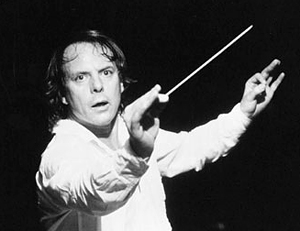The Famous Composer (and Urantia Book Reader) Karlheinz Stockhausen Has Died
The Famous Composer (and Urantia Book Reader) Karlheinz Stockhausen Has Died
 By Christian Ruch, Dattwil, Switzerland
By Christian Ruch, Dattwil, Switzerland
On the 5th of December 2007, the great German composer Karlheinz Stockhausen died at the age of 79. Famous for being a pioneer in modern music, such as electronic music, he is one of the most important representatives of post-war arts. The Beatles honoured him by putting him on the cover of the "Sgt. Pepper" record album. But what many people – even many readers of The Urantia Book – do not know is that he was one of the first Europeans and Germans to discover the fifth epochal revelation. How did this happen?
After an outstanding Stockhausen concert in New York City on the 25th of February 1971, a weird guy approached Stockhausen and shouted at him: "Stockhausen, I have to talk to you!" Everybody stepped aside. Stockhausen agreed to speak with the man, who had a long beard, was bare-footed, and had a long shepherd-like stick in his hand. The man began to play a flute, which he removed from his tattered coat. Stockhausen was amused, as he listened to the man first play his flute and then tell him about The Urantia Book, which Stockhausen bought for twenty dollars. He started reading the book when he returned to Germany.
In the mid-seventies the book was becoming more and more important for him. Once in 1974, he opened one of his lectures at the university in a very strange way: He came in, threw the blue book with a loud bang onto the desk and said: "If you want to remain my students, you must read this!" Some years later, The Urantia Book became one of Stockhouse's main inspirations for the opera-cycles LICHT (Light), a 29 hours long mega work, being composed between 1977 and 2003. The papers about the Lucifer rebellion play an especially important part in LICHT. Therefore, many people were introduced to The Urantia Book by Stockhausen's music.
After the German translation of The Urantia Book was published, Stockhausen often gave it away as a present. A few months before he died he told me: "You know, I often tell people now what I want to do when I have left. Then they look at me totally shocked, and I tell them: 'Well, I'd like to give you something to read.' "
The Urantia Book remains important for Stockhausen's work. For example, none of the following compositions have been performed yet: "HAVONA for bass and electronic music", "ORVONTON for baritone and electronic music", "UVERSA for basset-horn and electronic music", "NEBADON for horn and electronic music", "JERUSEM for tenor and electronic music, "URANTIA for soprano and electronic music", "EDENTIA for soprano saxophone and electronic music", and "PARADISE for flute and electronic music".
On the day he died he said to his partner Kathinka Pasveer: "Now there's the beginning of a totally new time, and I have found a new manner of breathing. Listen!" Then he wanted to go to his work, but he collapsed, and a heart-attack finished his life.
Have a good flight to Havona, Maestro! And thank you for all that you gave us. You gave us so much!
